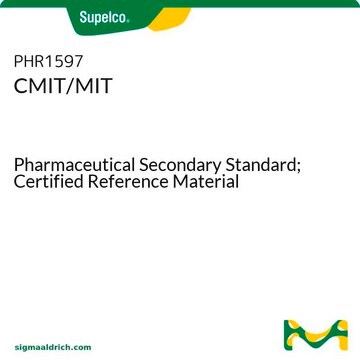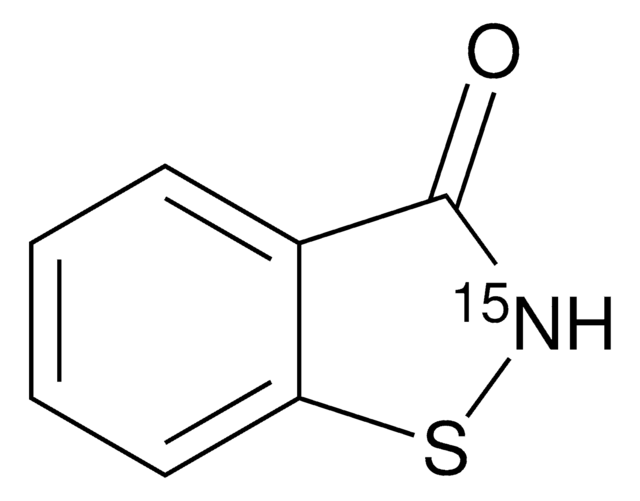46078
2-Octyl-4-isothiazolin-3-one
PESTANAL®, analytical standard
Synonym(s):
2-Octyl-3(2H)-isothiazolone, Octhilinone
About This Item
Recommended Products
grade
analytical standard
Quality Level
product line
PESTANAL®
shelf life
limited shelf life, expiry date on the label
application(s)
agriculture
environmental
format
neat
SMILES string
CCCCCCCCN1SC=CC1=O
InChI
1S/C11H19NOS/c1-2-3-4-5-6-7-9-12-11(13)8-10-14-12/h8,10H,2-7,9H2,1H3
InChI key
JPMIIZHYYWMHDT-UHFFFAOYSA-N
Looking for similar products? Visit Product Comparison Guide
Related Categories
Application
- Nonthermal Plasma in Wastewater Treatment: This research utilized nonthermal plasma-based advanced oxidation processes (AOPs) for degrading micropollutants, including isothiazolinones, in wastewater. The study underscores the effectiveness of 2-Octyl-4-isothiazolin-3-one in microbial growth control, providing insights into its applications in wastewater management and microbial contamination control (Chen et al., 2023).
- Surface Interactions of Semi-Volatile Isothiazolinones: The study quantified the equilibria of semi-volatile isothiazolinones, such as 2-Octyl-4-isothiazolin-3-one, between air and glass surfaces, using techniques like gas chromatography and Raman spectroscopy. This research is vital for understanding the stability and persistence of 2-Octyl-4-isothiazolin-3-one in various environments, particularly its use in biotech applications (Sohn et al., 2023).
Legal Information
Signal Word
Danger
Hazard Statements
Precautionary Statements
Hazard Classifications
Acute Tox. 2 Inhalation - Acute Tox. 3 Dermal - Acute Tox. 3 Oral - Aquatic Acute 1 - Aquatic Chronic 1 - Eye Dam. 1 - Skin Corr. 1B - Skin Sens. 1A
Supplementary Hazards
Storage Class Code
6.1A - Combustible acute toxic Cat. 1 and 2 / very toxic hazardous materials
WGK
WGK 3
Flash Point(F)
Not applicable
Flash Point(C)
Not applicable
Personal Protective Equipment
Certificates of Analysis (COA)
Search for Certificates of Analysis (COA) by entering the products Lot/Batch Number. Lot and Batch Numbers can be found on a product’s label following the words ‘Lot’ or ‘Batch’.
Already Own This Product?
Find documentation for the products that you have recently purchased in the Document Library.
Customers Also Viewed
Our team of scientists has experience in all areas of research including Life Science, Material Science, Chemical Synthesis, Chromatography, Analytical and many others.
Contact Technical Service












